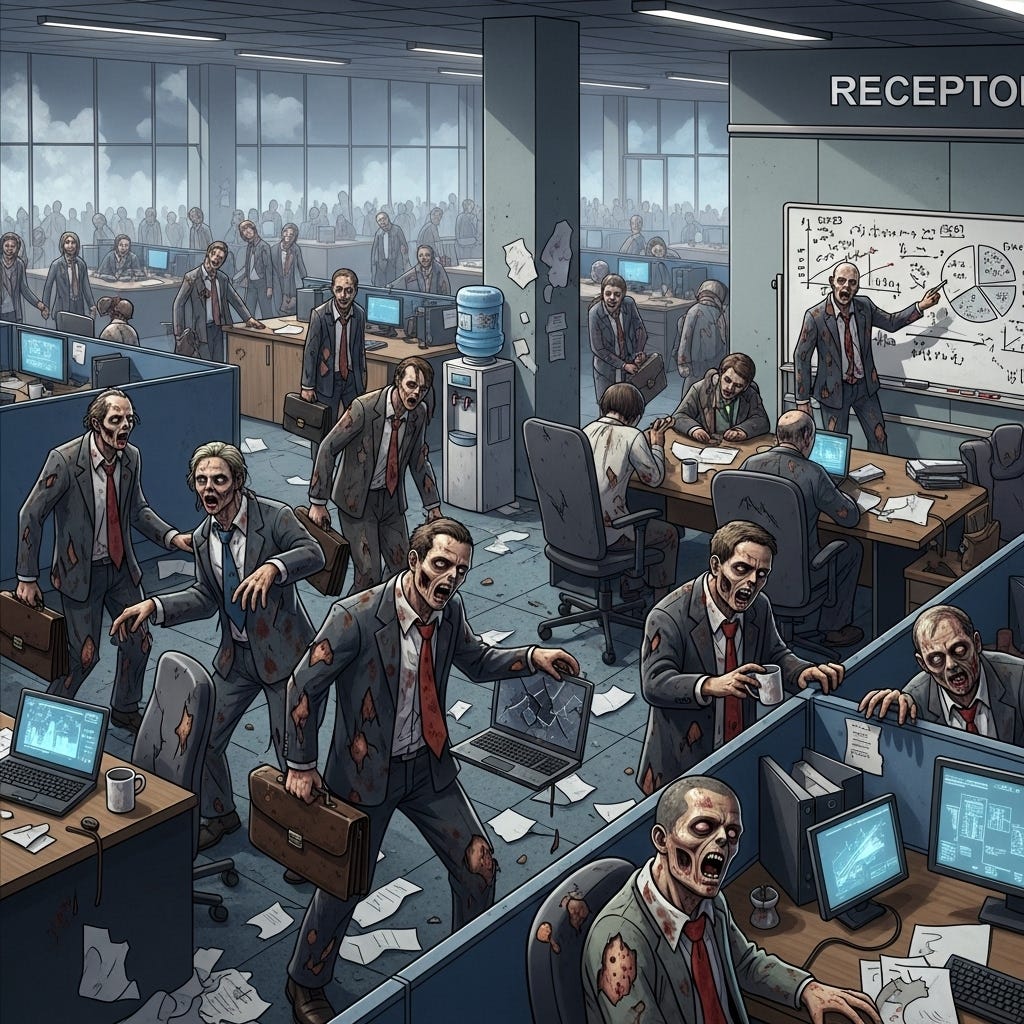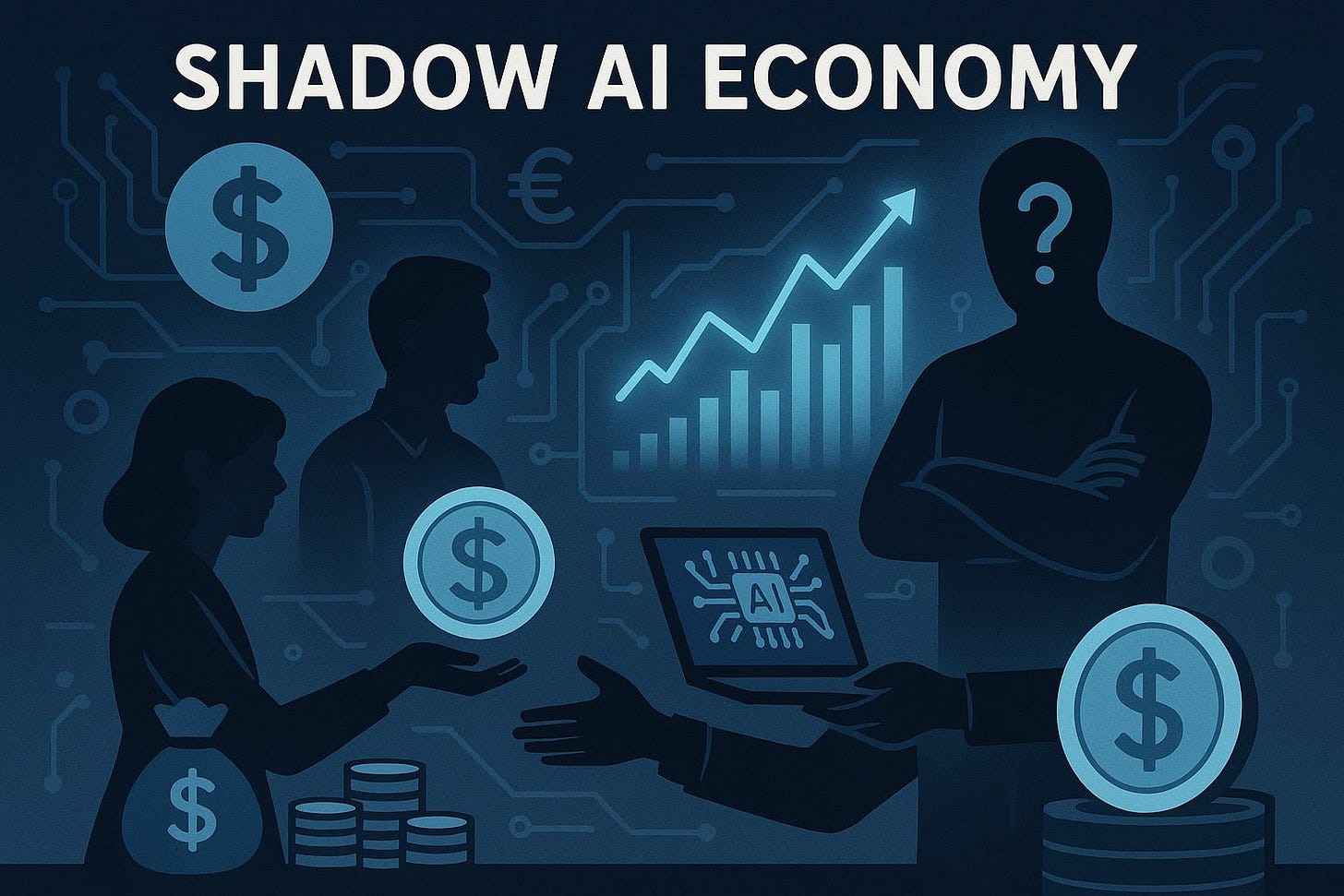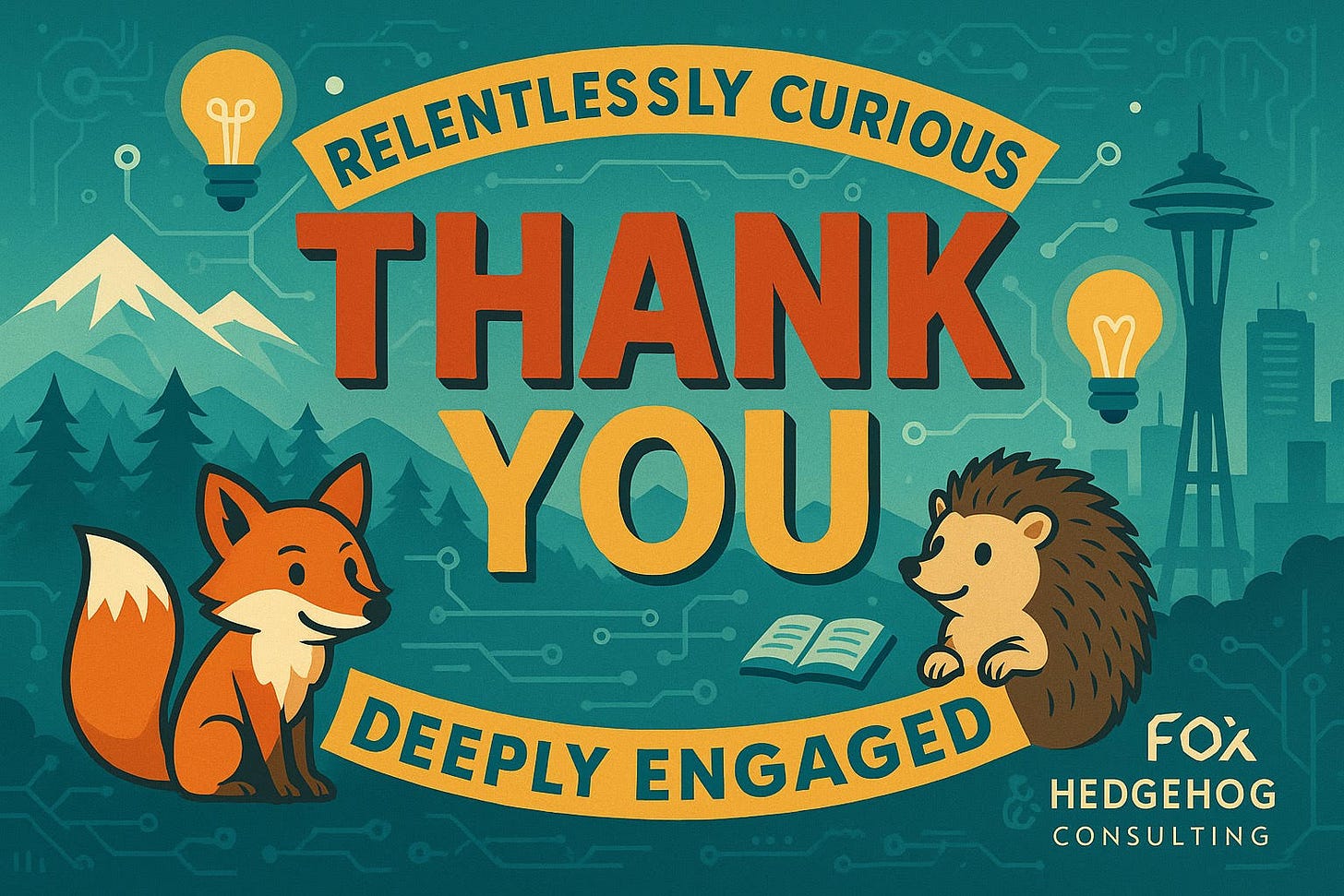Weekly Link Roundup #72
Zombie, digital twins and shadow economies, oh my!
A quick word about LinkedIn: Is there a lot of drivel and AI slop on LinkedIn? Can I tell you what spilling coffee in my lap taught me about B2B SaaS Sales? Sure. Do I think they went off the rails a bit with the whole games thing when machine-readable resumes and the ability to see a social graph of my network would be actually helpful? Also yes. But in my curated world, its where I can still find discussions like this taking place on the value and natural of qualitative vs quantitative research. And in these comments, I am squarely on Sam Ladner’s side.
Digital twin startup Twin Health secures $53M, nears $1B valuation: There’s just so much here to unpack. Who will own the “twin” once its built on your data? Will insurance companies be given access to the twin’s data? Your employer? Law enforcement? Don’t get me wrong, love the strides forward here but we’d be reckless to assume that personally identifiable health data won’t be a target for a number of nefarious reasons > > “Twin Health offers an AI-enabled digital twin that aims to provide individualized nutrition, sleep and activity guidance by analyzing data from smart devices to help people prevent and reverse metabolic diseases like Type 2 diabetes and obesity. "We address the root causes of chronic metabolic diseases to improve and reverse diabetes. Members use their own biomarker data — not population averages — to create their own AI digital twin that guides them in a way that is engaging, precise and sustainable," Jahangir Mohammed, founder and CEO of Twin Health, said in a statement.”
The Billion-Dollar Game Built in a Dorm Room (gift link): For those thinking about ‘gamification’ and wondering why the mere existence of leaderboards doesn’t transform your company overnight, read this > > “His most crucial innovation was the multiplayer format that he had used in Action Quake 2. Unlike in most shooters, which give players infinite lives, the deaths in Counter-Strike were permanent. If you were killed, you were out until the end of the round. “That concept was so critical to what made Counter-Strike so fun,” Le said. “It just really gave the game a sense of urgency. Like, your life mattered — and players played differently knowing that.” > > In games, the addiction is meaning. What means something to the players? How can you use that meaning the drive the behaviors you want to see? I will and will always prefer the much more accurate term “behavioral economics” to gamification. This is the first and still one of the best, presentations I’ve seen on it: Your Own Zombie Army - Driving User Behavior with Game Mechanics and Behavioral Economics.
Vibe Debugging: Enterprises' Up and Coming Nightmare: The Law of Unintended Consequences at scale and speed > > “Picture being a CTO right now: Your board is forwarding you every hot take like this one while your site reliability engineers are having night sweats about potential bugs and security flaws.” See also > > Tech debt isn’t an ‘IT issue.’ It’s a business strategy. - This is a great framework that will only become more valuable as vibe our way into unexplored vastness of vibe tech debt.
Silksong is out soon, and indie games are getting out of the way: Imagine this - you’ve created a game, an experience, a product, so compelling that not only are your customers chomping at the bit for it > > “Silksong is a full sequel to the excellent Hollow Knight and is currently the most wishlisted game on Steam, so it’s likely going to be very popular when it’s finally available” > > but your competitors are moving their next releases to get out of the way of your launch, for example > > “due to Silksong (can’t wait to play) launching just a day after CloverPit, we decided to delay our release our new release date is 26th Sept. we poured our hearts into our little game, so we want to give it the best possible shot. thanks for understanding!!” > > now that’s an aspirational goal (and I love that the other game devs are looking forward to playing it too :-)).
Google Drive now offers in-browser video editing: The browser is the most important piece of software we access on a daily basis. It’s a traffic cop, it can rig races so that certain sites win and others lose, its why GenAI spread so fast. All this means that we should pay attention to even small additions to the capabilities of them.
MIT report misunderstood: Shadow AI economy booms while headlines cry failure: This got so much bad traffic, even I wrote about it here. Michael Nunez nails it > > “The most widely cited statistic from a new MIT report has been deeply misunderstood. While headlines trumpet that “95% of generative AI pilots at companies are failing,” the report actually reveals something far more remarkable: the fastest and most successful enterprise technology adoption in corporate history is happening right under executives’ noses. But a closer reading of the 26-page report tells a starkly different story — one of unprecedented grassroots technology adoption that has quietly revolutionized work while corporate initiatives stumble.” Here’s the part that L&D teams can use > > “The researchers found that 90% of employees regularly use personal AI tools for work, even though only 40% of their companies have official AI subscriptions. “While only 40% of companies say they purchased an official LLM subscription, workers from over 90% of the companies we surveyed reported regular use of personal AI tools for work tasks,” the study explains. “In fact, almost every single person used an LLM in some form for their work.” > > Figure out how to tap into that shadow economy and take the lead by building that bridge and developing training to raise the literacy across the org.
Studying philosophy does make people better thinkers, according to new research on more than 600,000 college grads: Gosh, I wonder what skills will be important an AI-enabled world? > > “Philosophy majors rank higher than all other majors on verbal and logical reasoning, according to our new study published in the Journal of the American Philosophical Association. They also tend to display more intellectual virtues such as curiosity and open-mindedness.”
A foundation model to predict and capture human cognition: Seems like this could be important > > “Establishing a unified theory of cognition has been an important goal in psychology. A first step towards such a theory is to create a computational model that can predict human behaviour in a wide range of settings. Here we introduce Centaur, a computational model that can predict and simulate human behaviour in any experiment expressible in natural language.”
C.E.O.s Want Their Companies to Adopt A.I. But Do They Get It Themselves? (gift link): I can’t “HELL YEAH!” This enough > > “In March, Andy Katz-Mayfield, a co-founder of the razor brand Harry’s, started inviting junior employees to monthly meetings usually reserved for his most senior leaders. The purpose was for lower-level workers to show off how they were using generative artificial intelligence to improve the supply chain, finance and marketing. But Mr. Katz-Mayfield had another purpose, too: getting the top executives comfortable with using A.I. themselves.” > > Want to talk about all the things you can do to build a psychologically safe environment for people? Show leadership trying to do the things they’re asking you do to do.
Global Smart Glasses Shipments Soared 110% YoY in H1 2025, With Meta Capturing Over 70% Share: The killer AR/AI device. Also, there will be bar fights over people recording others without their knowledge or permission. So, you know, double-edged sword. See also: Class-action suit claims Otter AI secretly records private work conversations - different topic but if you thought privacy was already a battleground, just wait. See also: These smart glasses use AI to help low-vision users.
If you’re not reading The AI Economy by Ken Yeung - start now, you can still catch up. Ken is a great writer, seemingly finds his way to all the important events and discussions and brings the important pieces back.
Study: Social media probably can’t be fixed: Exactly. This echoes in a way, what I’ve been saying about the role of 800 year-old bookkeeping that only accounts for employees as costs - if you really want to achieve fundamental change, you need to look at fundamental structure. Also why behavioral economics will always be a better, more accurate phrase than gamification. > > “Numerous platform-level intervention strategies have been proposed to combat these issues, but according to a preprint posted to the physics arXiv, none of them are likely to be effective. And it's not the fault of much-hated algorithms, non-chronological feeds, or our human proclivity for seeking out negativity. Rather, the dynamics that give rise to all those negative outcomes are structurally embedded in the very architecture of social media.”
Wow. Aman Chadha did the work! We use the term “AI” a lot. In actuality though, “AI” contains legions. It is about K-nearest neighbors, Convolutional Neural Networks (CNN), Distributed Training Parallelism, and Reinforcement Fine Tuning. Now you might not feel the need to know all of those pieces in detail but if you do, Aman has put together an amazing site, the art of artificial intelligence one concept at a time, that links to outlines on each topic and those link to detailed but digestible sections on those pieces. It’s really an amazing resource. Huge thanks Aman!





